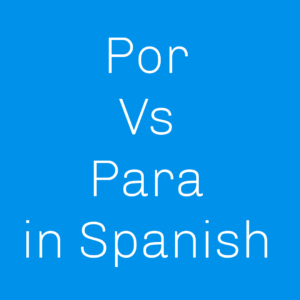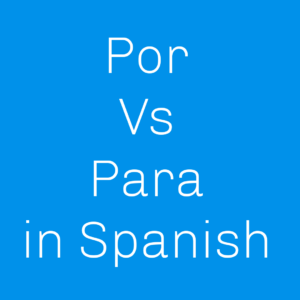Let’s find out
when to use para vs por in Spanish.
Study basic grammar rules with online lessons. Read about how and when to use some important words and phrases.

What is the difference between Por and Para in Spanish?
Note: “Por” and “para” have a variety of meanings and they are often confused because they can each be translated as “for”
e.g.
Gracias por el regalo – Thanks for the gift
Este regalo es para mi abuela- This gift is for my grandmother
Note:
“Por” has many uses, and so it is the more problematic of the two.
Rule: to express gratitude or apology
e.g.: Gracias por la ayuda.
(Thanks for the help.)
Rule: for multiplication and division
e.g.: tres por tres son nueve.
(three times three equals nine.)
Rule: for velocity, frequency, and proportion
e.g.: Voy al cine dos veces por semana.
(I go to the theater two times per week.)
Rule: meaning “through,” “along,” “by” or “in the area of”
e.g.: Andamos por el centro.
(We walk through the mall.)
Rule: when talking about exchange, including sales
e.g.: Él me dió esto por eso.
(He gave me this for that.)
Rule: to mean “on behalf of,” or “in favor of,”
e.g.: Yo voté por ella.
(I voted for her.)
Rule: to express a length of time
e.g.: Yo estuve allí por tres horas.
(I was there for three hours.)
In Spanish Por Vs Para
Rule: to express an undetermined, or general time, meaning “during”
e.g.: Se puede ir por el dia.
(You can go during the day.)
Rule: for means of communication or transportation
e.g.: Prefiero hablar por mi teléfono celular
(I prefer to talk on my cell phone.)
Rule: in cases of mistaken identity, or meaning “to be seen as”
e.g.: Me conocen por rápido.
(They know me for fast.)
Rule: to show the reason for an errand (with ir, venir, pasar, mandar, volver, and preguntar)
e.g.: Paso por ti a las siete.
(I’ll come by for you at seven o’clock.)
Rule: when followed by an infinitive, to express an action that remains to be completed, use por +
infinitive
e.g.: La canción está por terminar.
(The song is about to end.)
Rule: to express cause or reason
e.g.: El mujer perdió por falta de práctica.
(The woman lost for lack of practice).
Rule: “estar por” means to be in the mood, or inclined to do something
e.g.: Estoy por terminar
(I’m about to finish.)
Rule: in passive constructions
e.g.: El poema fue escrito por Carlos
(The poem was written by Carlos.)
What’s the difference between Para vs Por in Spanish?.
Note: “Por” also appears in many idiomatic expressions:
por adelantado – in advance
por ahora – for now
por allí – around there; that way
por amor de Dios – for the love of God
por aquí – around here; this way
por casualidad – by chance
por ciento – percent
por cierto – certainly
por completo – completely
por dentro – inside
por desgracia – unfortunately
por ejemplo – for example
por eso – therefore
por favor – please
por fin – finally
por lo general – generally
por lo visto – apparently
por medio de – by means of
por lo menos – at least
por lo tanto – consequently
por mi parte – as for me
por ningún lado – nowhere
por otra parte – on the other hand
palabra por palabra – word for word
por primera vez – for the first time
por separado – separately
por supuesto – of course
por suerte – fortunately
por todas partes – everywhere
por todos lados – on all sides
por ultimo – finally
Note: “Para” — in contrast, has relatively fewer uses.
Rule: to indicate destination
e.g.: El hombre se fue para su casa
(The man went home)
Rule: To show the use or purpose of a thing
e.g.: Los ojos son para ver.
(The eyes are to see.)
Rule: to mean “in order to” or “for the purpose of”
e.g.: Para hacer una pizza, necesitas harina.
(To make a pizza, you need flour)
Rule: to indicate a recipient
e.g.: Esta carta es para ti.
(This letter is for you.)
Rule: to express a deadline or specific time
e.g.: Necesito el pastel para el Domingo.
(I need the cake for Sunday.)
Rule: to express a contrast from what is expected
e.g.: Para ser un anciano, se comunica muy bien.
(To be an elder, he communicates very well.)
Rule: “estar para” to express an action that will soon be completed
e.g.: La profesora está para enseñarles
(The teacher is there to teach them.)
Study the two examples:
e.g.
Ana compró el regalo para Jorge.
Anna bought the gift for Jorge.
(She bought the gift to surprise him)
Ana compró el regalo por Jorge.
Anna bought the gift for Jorge.
(She bought it because he could not, or because Jorge advice her to get the gift)
Note: “Por” and “para” can also be used in questions. “¿Por qué?” means “Why?” (for what reason) while “¿Para qué?” means “Why?” (for what purpose).
e.g.
¿Por qué hablas tanto? – For what reason do you talk so much?
¿Para qué quieres más dinero? – For what purpose do you want more money?
Popular Spanish categories to find more words and phrases:
A new category where you can find the top search words and phrases translated into English and Spanish. Be an expert in no time!
A new category where you can find the top search words and phrases translated into English and Spanish. Be an expert in no time!
This category has hundreds of words translated into Spanish and English. Just like a dictionary!
This category has hundreds of words translated into Spanish and English. Just like a dictionary!
In this Spanish category, you will find the translation of words and phrases in Spanish, with many sentences that will help you determine how each phrase or word is applied.
In this Spanish category, you will find the translation of words and phrases in Spanish, with many sentences that will help you determine how each phrase or word is applied.
Here are several infographics if you are looking to learn or teach the basic Spanish vocabulary for foreigners. Learn basic Spanish. Videos and resources to learn basic Spanish, Spanish for beginners.
Here are several infographics if you are looking to learn or teach the basic Spanish vocabulary for foreigners. Learn basic Spanish. Videos and resources to learn basic Spanish, Spanish for beginners.
The different verb tenses of Spanish are essential to understanding the language. Find out how to refer to the past, present, and future.
The different verb tenses of Spanish are essential to understanding the language. Find out how to refer to the past, present, and future.
Spanish to Go offers introductory courses you can take to learn Spanish online at your own pace. Whether you are learning Spanish to study or because you want to travel to a Spanish-speaking country. Find online courses to learn grammar, and basic Spanish.
Spanish to Go offers introductory courses you can take to learn Spanish online at your own pace. Whether you are learning Spanish to study or because you want to travel to a Spanish-speaking country. Find online courses to learn grammar, and basic Spanish.
Study Spanish grammar, learn the rules, and know-how and when to apply them.
Study Spanish grammar, learn the rules, and know-how and when to apply them.


Leave a Reply
You must be logged in to post a comment.